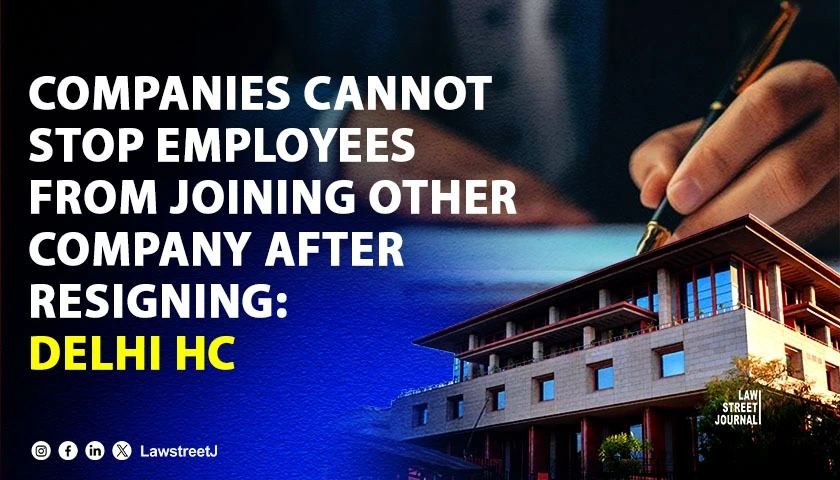New Delhi: The Delhi High Court has delivered a landmark judgment declaring that employment contract terms restricting an employee’s right to work after termination are void under Section 27 of the Indian Contract Act, 1872, emphasizing the fundamental right to livelihood and freedom of trade.
The court of Justice Tejas Karia made crucial observations on non-compete clauses and their enforceability in the Indian legal context, while addressing a case involving an appeal filed by Varun Tyagi against Daffodil Software Private Limited. The appeal challenged an interim injunction that prevented him from working with Digital India Corporation (DIC) and the National E-Governance Division (NeGD). The court noted, “Any terms of the employment contract that impose a restriction on the right of the employee to get employed post-termination of the contract of employment shall be void, being contrary to Section 27 of the ICA.”
Addressing the specific concerns regarding post-employment restrictions, the court observed, “The Impugned Order has restricted the Appellant from working with DIC and NeGD during the pendency of the Suit on an apprehension that the Appellant may disclose proprietary information, intellectual property, insider knowledge, source code, etc. However, the scope of work between DIC and the Respondent was limited to providing the supply of manpower.”
The court highlighted the distinction between restrictions during employment versus post-employment, stating, “Negative covenants operative during the period of the contract of employment, when the employee is bound to serve his employer exclusively, are generally not regarded as restraint of trade and therefore do not fall under Section 27 of the Contract Act.”
In a specific directive concerning intellectual property concerns, the court instructed, “The contractual term between DIC and the Respondent provided that the intellectual property rights over the developed software code and related documentation shall belong to DIC. Hence, the apprehension of the Respondent that confidential information or intellectual property shall be shared with DIC is misconceived, as the same already belongs to DIC.”
The court emphasized the importance of protecting employee rights while balancing employer interests, referencing the Supreme Court decision in Superintendence Company of India v. Krishan Murgai, which established that Section 27 of the Indian Contract Act does not distinguish between partial and complete restraints.
The court rejected the application of English law principles regarding the reasonableness test, noting that under Indian law, all contracts falling within Section 27 are void unless they fall within specific exceptions.
Justice Karia also cited the American Express Bank Ltd. v. Ms. Priya Malik case, emphasizing, “Freedom of changing employment for improving service conditions is a vital and important right of an employee, which cannot be restricted or curtailed on the ground that the employee has the employer’s data and confidential information.”
The court set aside the trial court’s interim injunction and allowed the appellant to continue working with DIC, finding that the balance of convenience favored the employee’s right to livelihood over speculative concerns about confidentiality breaches.
Appearance:
For the Appellant: Mr. Asav Rajan, Mr. Ajay Sharma, Mr. Mayank Biyani, Mr. Akash Saxena, Mr. Kashish Sharma & Mr. Devang Shrodriya, Advocates
For the Respondent: Mr. Divyakant Lahoti, Ms. Vindhya Mehra, Ms. Tanisha Verma, Mr. Raghav Saluja & Mr. Kartik Lahoti, Advocates
Case Title: Varun Tyagi vs. Daffodil Software Private Limited







![Delhi High Court Sets Aside Arbitral Tribunal's Award Against NHAI in Highway Project Delay Case [Read Judgment]](/secure/uploads/2023/07/lj_9605_23374c2e-392c-4491-a2fe-f2f12fc5272f.jpg)
![Delhi Court Rejects Stay Request in Defamation Case Against Rajasthan CM Ashok Gehlot [Read Order]](/secure/uploads/2023/08/lj_5208_80de1ddc-d76a-4f7f-b180-408e3ae14fb4.jpg)








Mohammed Alim Jul 04, 2025
Congratulations n proud to have an Indian at this prestigious position....